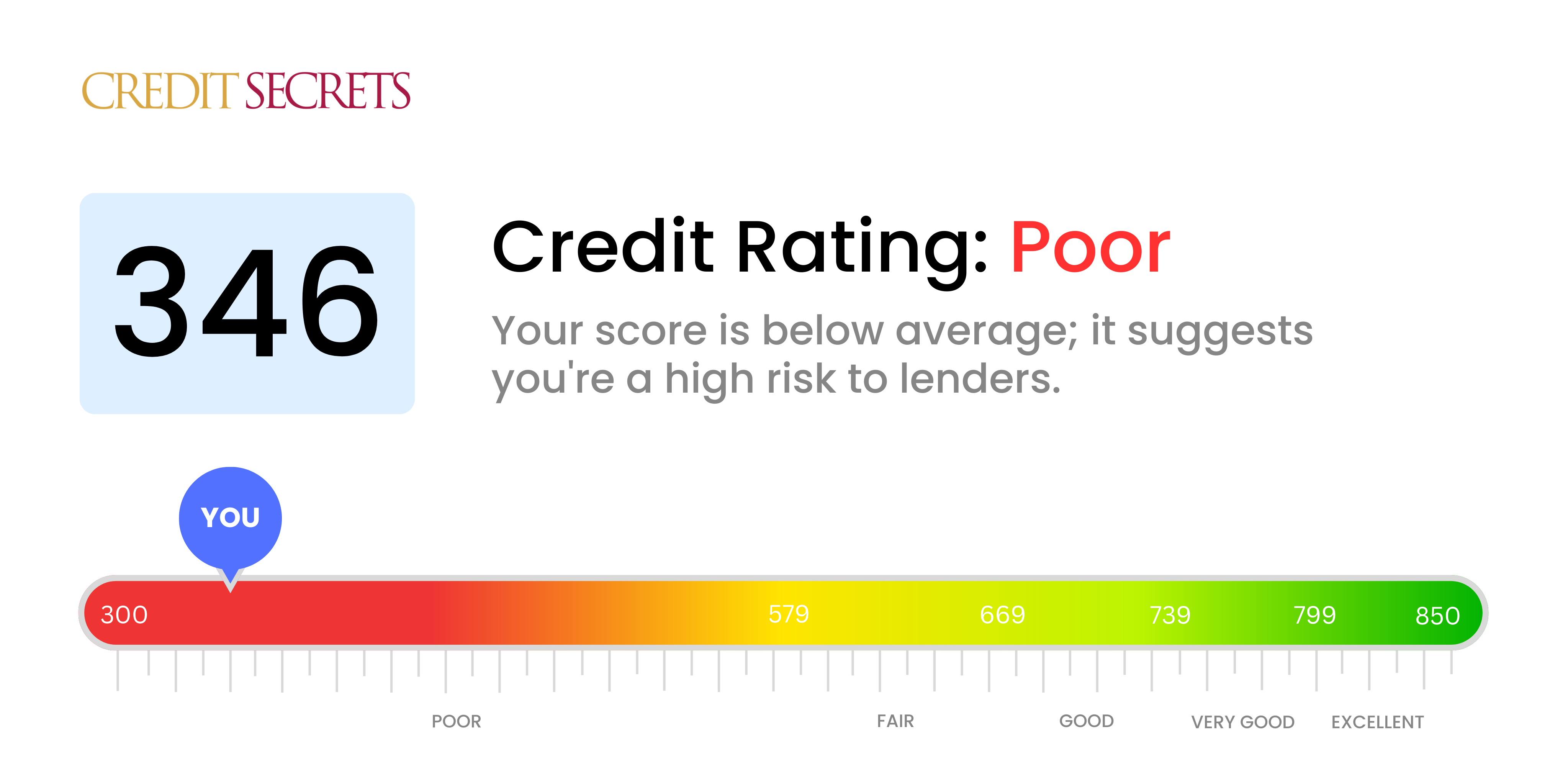Is 346 a good credit score?
A credit score of 346 is considered poor. With this score, you may face challenges when applying for loans, credit cards, or other forms of credit. Lenders may view you as a high-risk borrower and may offer you less favorable terms or higher interest rates.
There are steps you can take to improve your credit score and achieve your financial goals. By implementing responsible credit habits, such as making payments on time, reducing your debt, and monitoring your credit report for errors, you can gradually rebuild your creditworthiness and open doors to better financial opportunities.

Can I Get a Mortgage with a 346 Credit Score?
Can I Get a Credit Card with a 346 Credit Score?
Can I Get a Personal Loan with a 346 Credit Score?
A credit score of 346 is significantly below the standard range that most traditional lenders consider acceptable for approving a personal loan. In the eyes of a lender, a score this low represents a high level of risk, making it unlikely that you would be approved for a loan under conventional terms. The situation is undoubtedly challenging, but it's important to face the reality of what this credit score implies for your borrowing options.
If traditional loans are off the table, you might consider alternatives like secured loans, where you provide collateral, or co-signed loans, where someone with better credit vouches for you. Peer-to-peer lending platforms are another option, as they sometimes offer more lenient credit requirements. However, it's crucial to understand that these alternatives often come with higher interest rates and less favorable terms, reflecting the higher risk to the lender.
Can I Get a Car Loan with a 346 Credit Score?
What Factors Most Impact a 346 Credit Score?
Payment History
Payment history has a substantial impact on your credit score. If there are late payments or defaults, this could be a key contributing factor.
How to Check: Review your credit report for any late payments or defaults. Reflect on any instances of delayed payments, as these could have affected your score.
Credit Utilization
High credit utilization can negatively affect your score. If your credit cards are near their limits, this might be a contributing factor.
How to Check: Examine your credit card statements. Are the balances close to the limits? Aiming to keep balances low compared to the limit is beneficial.
Length of Credit History
A shorter credit history can influence your score negatively.
How to Check: Review your credit report to assess the age of your oldest and newest accounts and the average age of all your accounts. Consider whether you have recently opened new accounts.
Credit Mix and New Credit
Having a variety of credit types and managing new credit responsibly are essential for a good score.
How to Check: Evaluate your mix of credit accounts, such as credit cards, retail accounts, installment loans, and mortgage loans. Consider whether you have been applying for new credit sparingly.
Public Records
Public records like bankruptcies or tax liens can significantly affect your score.
How to Check: Examine your credit report for any public records. Address any items listed that may need resolution.
Remember, improving your credit score is a journey that requires patience and dedication. By understanding the factors impacting your score and taking proactive steps to address them, you can set yourself on the path to financial success.How Do I Improve my 346 Credit Score?
A credit score of 346 is considered very poor, but don’t lose hope! With targeted steps, you can start improving your credit score. Here are the most impactful and accessible strategies for your current situation:
1. Address Past-Due Accounts
If you have any accounts that are past due, it’s crucial to bring them current. Start by focusing on paying off the most overdue accounts first, as they have the most significant negative impact on your credit score. If needed, reach out to your creditors to negotiate a payment plan.
2. Reduce Credit Card Balances
High credit card balances relative to your credit limit can greatly affect your credit score. Aim to reduce your credit card balances to below 30% of your credit limit, with a long-term goal of keeping them below 10%. Prioritize paying down the cards with the highest utilization rates first.
3. Secured Credit Card
Given your current score, qualifying for a regular credit card might be challenging. Consider applying for a secured credit card, which requires a cash collateral deposit that serves as the credit line for that account. Use it responsibly by making small purchases and paying off the balance in full each month to build a positive payment history.
4. Become an Authorized User
Ask a family member or a friend with good credit if you can be added as an authorized user on their credit card. This can help improve your credit score by incorporating their positive payment history into your credit report. Just make sure the card issuer reports authorized user activity to the credit bureaus.
5. Diversify Your Credit Mix
A diverse mix of credit accounts can contribute to improving your credit score. Once you have established a good payment history with a secured card, explore other types of credit, such as a credit builder loan or a retail credit card, and manage them responsibly.
Remember, improving your credit score takes time and effort, but it is achievable. By taking these steps and staying committed to responsible financial habits, you can start rebuilding your credit and achieving your financial goals.
